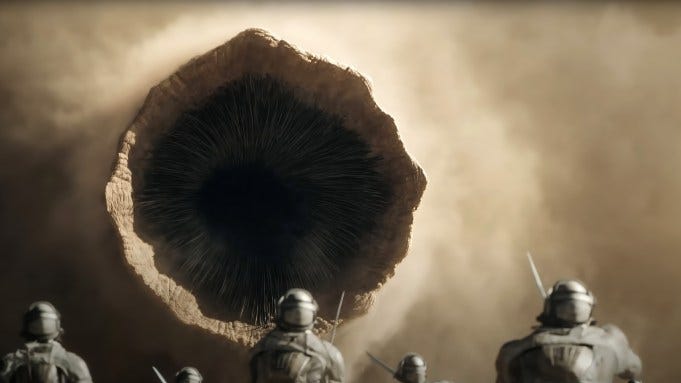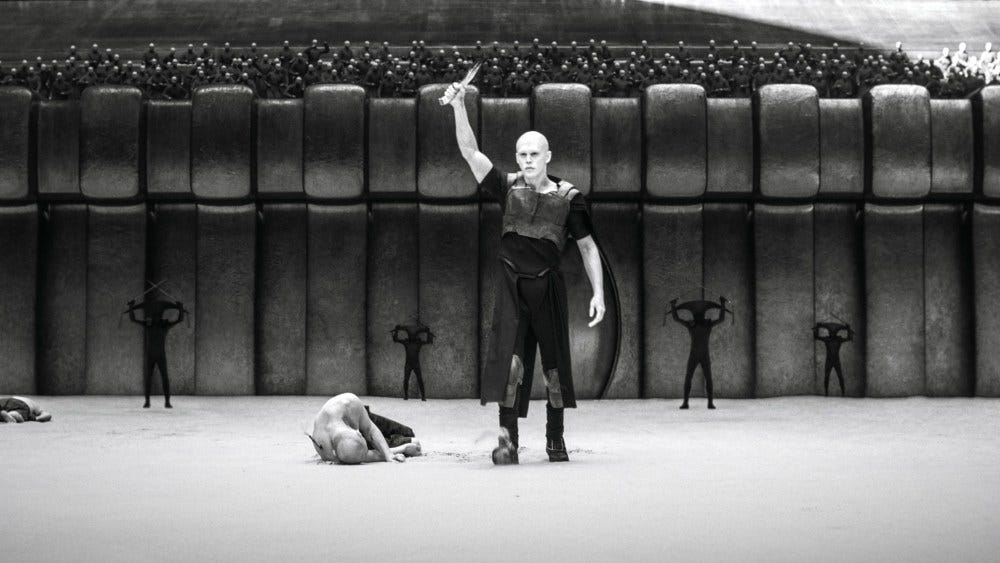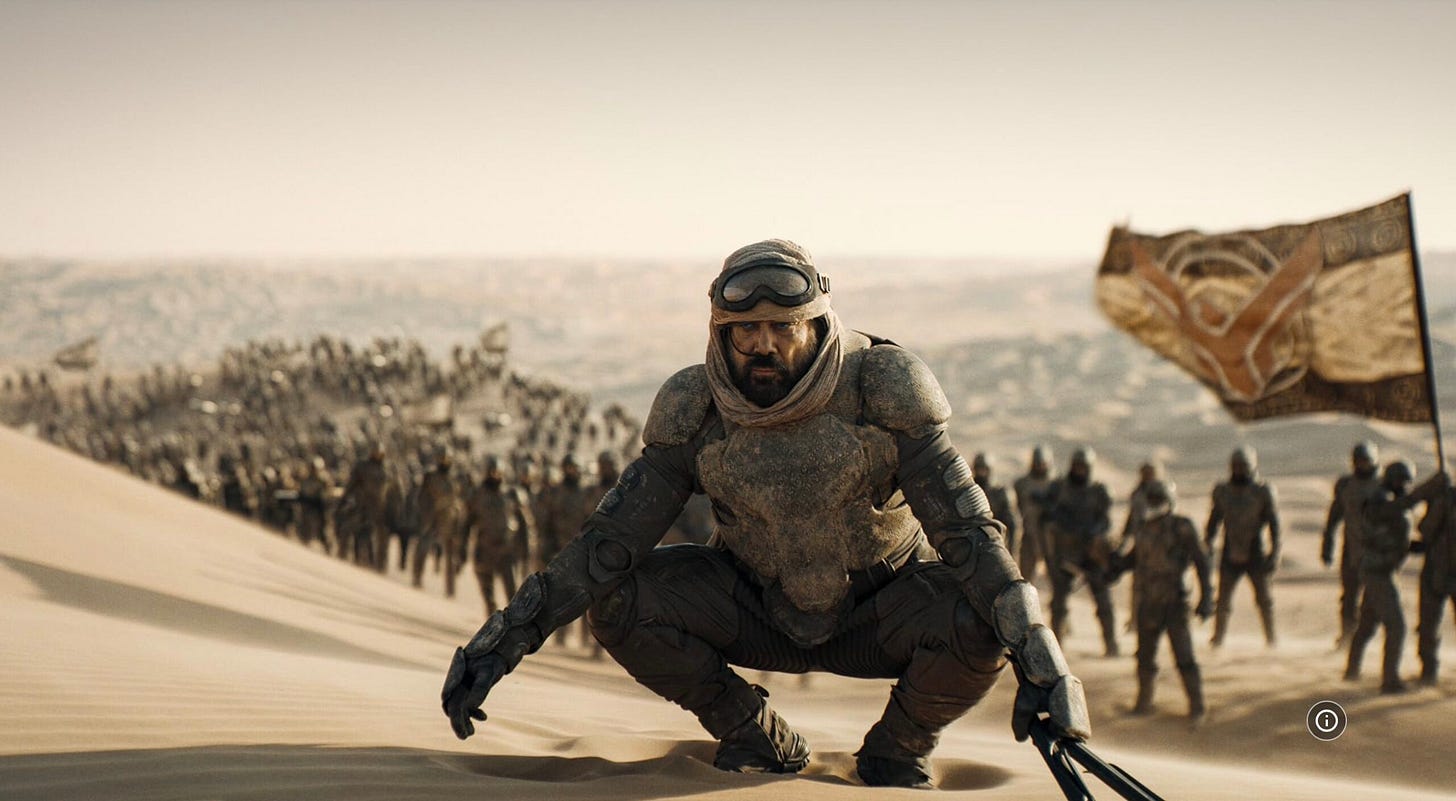Human Lens #144: 'Dune: Part Two' Review
The highly anticipated sequel finally arrives and it's better in every way.
In 2021, visionary filmmaker Denis Villeneuve captured audiences imagination by bringing the acclaimed sci-fi novel Dune to life for the first time since David Lynch’s critically panned turn of the material in 1984. Opening that film with a jarringly alien voice on a black screen chanting “Dreams are messages from the deep,” Villeneuve grabbed hold of the audiences attention and never looked back. The first two and a half hours of this saga, only covering half of the novel, was a richly crafted and otherworldly epic chronicling a young man’s forced coming of age and how taking dreams at face value, or even just following them blindly, can come at a cost.
Villeneuve has officially returned to the desert planet of Arrakis with this past weekend’s release of Dune: Part Two, where we continue the journey of Paul Atreides and expand on the aforementioned themes from the first film. With the heavy groundwork and world building already established (the only flaw of the almost perfect first film), Villeneuve can now delve into the heavier plots and ideas explored in the novel, crafting a blockbuster epic that’s aggressively thought provoking, sticking to the soul and hijacking personal moments of zen like few modern blockbusters are able to accomplish.

Dune: Part Two picks up immediately where the first film left off, as Paul must face the destiny that is being “forced” upon him. I put that in quotes because he willing pushes forward his ascension alongside his mother, while saying to opposite to anyone who questions him. Throughout the Great Houses, political power is being maneuvered as if the Atreides bloodline is gone, but Paul slowly gains power unbeknownst to them, while also slowly losing a part of himself that his dreams have always been alluding to. His intentions may be good, but actions speak louder than words, and the events of this film are the dreadful downfall of a man trying to do the right thing while being unable to escape the thick shadow of revenge.
As nearly everyone else has already discussed in reviews across print media, physical and digital alike, the technical expertise showcased in this film is nothing short of extraordinary from all departments. Visual effects throughout the film are actually crafted and delivered with care, making the incessant amount of rushed Hollywood blockbusters look like a joke in comparison. The greatest example that will continue to garner praise are the sandworms, which mix digital and practical filmmaking techniques to create a theatrical viewing experience unlike any other. Paul’s first ride on the back of a “grandfather” worm draws attention like only the greatest movie scenes in history could. It makes you want to understand how it was achieved, but worried at the same time that figuring it out will ruin the immersion of what makes the sequence so special.

Outside of visual effects, the praise doesn’t stop, as the sound department, camera team, and costume and set designers deserve mountainous praise for elevating all of their crafts after their work in the first film. Devices, weapons, and ambient sounds combine with Hans Zimmer’s brilliant continuation of the score to create splendidly specific soundscapes and environments that can only be explained as exactly how something would sound. I’m personally obsessed with the '“thumper,” a device that calls the worms by making a mechanical rhythmic and plastic-like thrumming, as the device slides up and down a pipe in the center. I wish there was a better way to explain it other than just stating that the noise it makes in the film is exactly correct. Then there’s Greig Fraser’s work behind the camera, utilizing breathtaking, digital, IMAX cameras in the desert to visceral effect, with a standout scene in this film being his use of infrared to film the Harkonen’s home planet as black and white.

Despite the publication of the novel being in 1965, Frank Herbert’s rich themes and political analyses were minutely dissected by Villeneuve when piecing together this second chapter. The world of Dune consists of backstabbing politicians and monarchs sifting through the waters of power by arguing over material matter which they’ve deemed a necessity, all while invoking utilitarianism in the name of the universe’s safety. Take out all of the fancy sci-fi words and you have the exact political climate in the year of the film’s release.
The priorities of the people in power have only gotten more muddied and personal as the decades since the novel’s release, making the vision of Herbert that much more remarkable. There is a specific emphasis throughout this film that the Bene Gesserit have their own vision for the universe, removed from elected officials and the ideals of the people throughout the universe. Despite this, their power has unwittingly placed them at the right hand of all the houses within the Imperium, working as galactic editors for a script that’s slowly becoming their demented vision, without any care in the world of who achieves those goals or at what cost.

But the most stunning exploration this film accomplishes is the cost of religious beliefs on a culture and how assigning messianic qualities and desires to someone has nothing but negative effects for all. The generational and geographical belief system is something rarely portrayed in religion for sci-fi stories, and is honestly rare for any film or story. Showing all interpretations of life through different age groups and regions brings about a lesson in respecting your neighbor despite their beliefs, while also making the final act that much more disturbing and emotionally draining, as characters we like are clouded by indoctrinated ideas that have permeated their every thought since their upbringing.

I could write about specific beats, scenes, and minute details for hours upon hours but I’d lose almost everyone reading this. All anyone needs to know is that Dune: Part Two is a theatrical event and experience that shouldn’t be missed. It’s a group of the biggest movie stars coming together with one of the greatest working directors to bring an intoxicating and approachable sci-fi film to the masses. This is a Return of the King level event that should garner the same amount of praise, and it deserves everything coming its way this year. Bring on part three.



